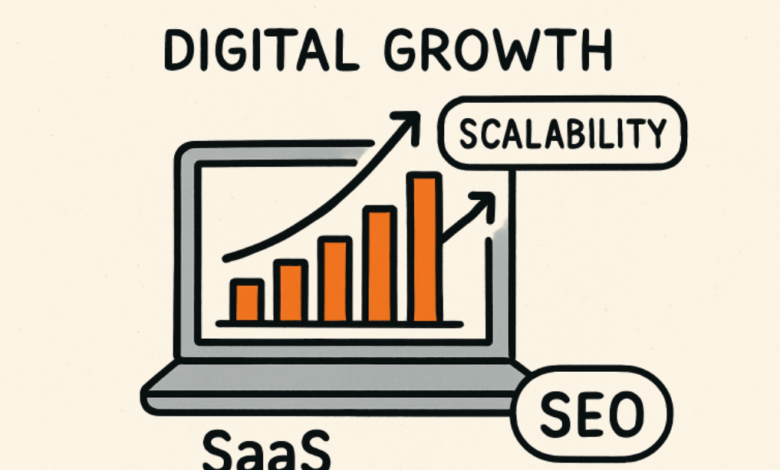Building Scalable SEO Strategies for SaaS Businesses

Introduction: Why SaaS Companies Need Scalable SEO
The SaaS industry is a dynamic and rapidly evolving market, facing unique challenges as subscription-based services must continuously attract, engage, and retain customers online. As competition intensifies and digital channels multiply, a scalable SEO strategy becomes essential for visibility and long-term growth. A well-executed SEO plan allows SaaS businesses to ride the waves of algorithm updates, adapt to shifting digital behaviors, and maintain a competitive edge.
Unlike traditional companies, SaaS brands rely on recurring revenue, making continuous customer acquisition and retention crucial. Adaptability is key because of fast-changing user needs, shifting buyer journeys, and digital-first competition. Partnering with a trusted SaaS SEO agency can provide SaaS organizations with the expertise and tools to implement sophisticated, flexible, and results-driven SEO strategies that scale with business goals. A well-executed approach can increase organic visibility, attract high-intent leads, and reduce reliance on costly paid channels. Over time, this creates a steady pipeline of loyal customers. Ultimately, strategic SEO becomes a growth engine that fuels long-term profitability and market leadership.
Core SEO Foundations for SaaS Leaders
A robust SEO foundation is critical before advanced tactics can deliver results. This begins with comprehensive keyword research tailored to SaaS buyer personas and pain points. Understanding the specific questions and needs your prospects search for will inform content creation and site structure. Clear, logical site architecture also improves crawlability, ensuring that search engines can index priority pages efficiently.
Staying up-to-date with industry standards is also vital. Recent Google search quality rater guidelines updates emphasize expertise, authoritativeness, and trustworthiness—qualities SaaS brands must demonstrate across their web presence. Prioritizing these factors forms the bedrock upon which all scalable SEO strategies are built.
See also: How to Get a Professional Website Built for Your Business
Crafting High-Quality, Search-Optimized Content
SaaS buyers take complex, research-driven journeys before making decisions. Your content strategy should address this by meeting user intent at every funnel stage. Thoughtful blog posts, in-depth product guides, case studies, and educational resources serve different audience segments while building topical authority in your niche.
Content must go beyond surface-level keyword placement to address real users’ challenges, aspirations, and questions. Authority-building content—detailed tutorials, white papers, and real-world success stories—signals credibility to readers and search engines. Maintaining an editorial calendar for SaaS brands that reflects trending topics and evergreen queries can help drive consistent organic growth.
Technical SEO Upgrades for Future-Proof Growth
A technically sound website is non-negotiable for SaaS companies competing online. Site speed, mobile responsiveness, and structured data ensure a positive user experience and satisfy search engine requirements. As Google continually refines its algorithms to prioritize usability and relevance, technical SEO upgrades become instrumental for future-proof success. Regular site health audits can reveal and resolve issues such as broken links, slow load times, and crawl errors before they undercut organic performance.
Implementing schema markup for software products, integrating robust analytics, and ensuring mobile-first design are actionable steps that align with evolving best practices. Proactive technical optimization positions SaaS platforms to weather updates and algorithm shifts, ensuring sustainable growth.
SEO Analytics: Measuring What Matters
To justify SEO investment and guide strategy, SaaS companies should define and monitor the right metrics, such as organic sign-ups, demo requests, churn rates from organic acquisition, and customer lifetime value. Tracking user journeys—from initial search through onboarding and retention—helps clarify which SEO efforts drive business outcomes.
Analytics platforms like Google Analytics, Search Console, and heatmapping tools facilitate granular monitoring. Responding rapidly to data—by pivoting strategies, running split tests, or refreshing underperforming pages—ensures continual optimization. The most successful SaaS brands integrate actionable SEO insights into product development, marketing, and customer support workflows.
Link Building and Partnerships in the SaaS Ecosystem
Earning high-quality backlinks remains a cornerstone of effective SEO, but strategies for SaaS differ from those in other sectors. Focus on earning links from respected industry publications, tech blogs, and education partners rather than relying on outdated tactics. Collaboration is key: co-branded content, data-driven studies, and educational webinars build relationships that lead to natural, authoritative link acquisition.
The latest SaaS SEO strategies emphasize the importance of community engagement and thought leadership over simple promotion. SaaS companies grow their visibility and credibility in the ecosystem by offering value and insights to audiences and partners.
Real World Examples: SaaS SEO Success Stories
Consider the example of a SaaS CRM provider that identified low-competition, high-intent keywords related to sales automation for niche verticals. By crafting in-depth tutorials and integrating customer case studies, they increased organic demo sign-ups by 45% within seven months. Another SaaS team invested in a site-wide technical update, resulting in a 30% reduction in bounce rates and measurable improvements in search rankings for competitive terms.
The common thread in these stories is a commitment to data-backed experimentation and ongoing adaptation. Lessons learned—such as the value of targeted content, or the power of strategic partnerships—can be readily applied across SaaS categories for repeatable success.
Ongoing Adaptation: Staying Ahead in SaaS SEO
The digital landscape is constantly shifting. To maintain performance, SaaS businesses must schedule regular SEO audits, participate in industry discussions, and stay updated on algorithm changes and user behavior trends. Engaging with the broader SaaS and SEO communities through webinars, forums, and industry publications provides access to new insights and keeps strategies flexible and future-ready.
Cultivating a culture of experimentation—testing new formats, refining messaging, and updating old content—ensures that growth is sustained, not just achieved. Flexibility is especially critical for SaaS, where competitive advantages can vanish quickly amid technological shifts and evolving user needs.
Conclusion: Sustainable Growth Through Scalable SEO
Building a scalable SEO strategy isn’t a one-time project—it’s an ongoing investment that compounds over time. SaaS businesses can unlock sustainable growth by establishing strong technical foundations, creating meaningful content, measuring what matters, and adapting to change. Embracing industry best practices and committing to continuous improvement will position your SaaS brand to thrive amid change and outpace the competition.






